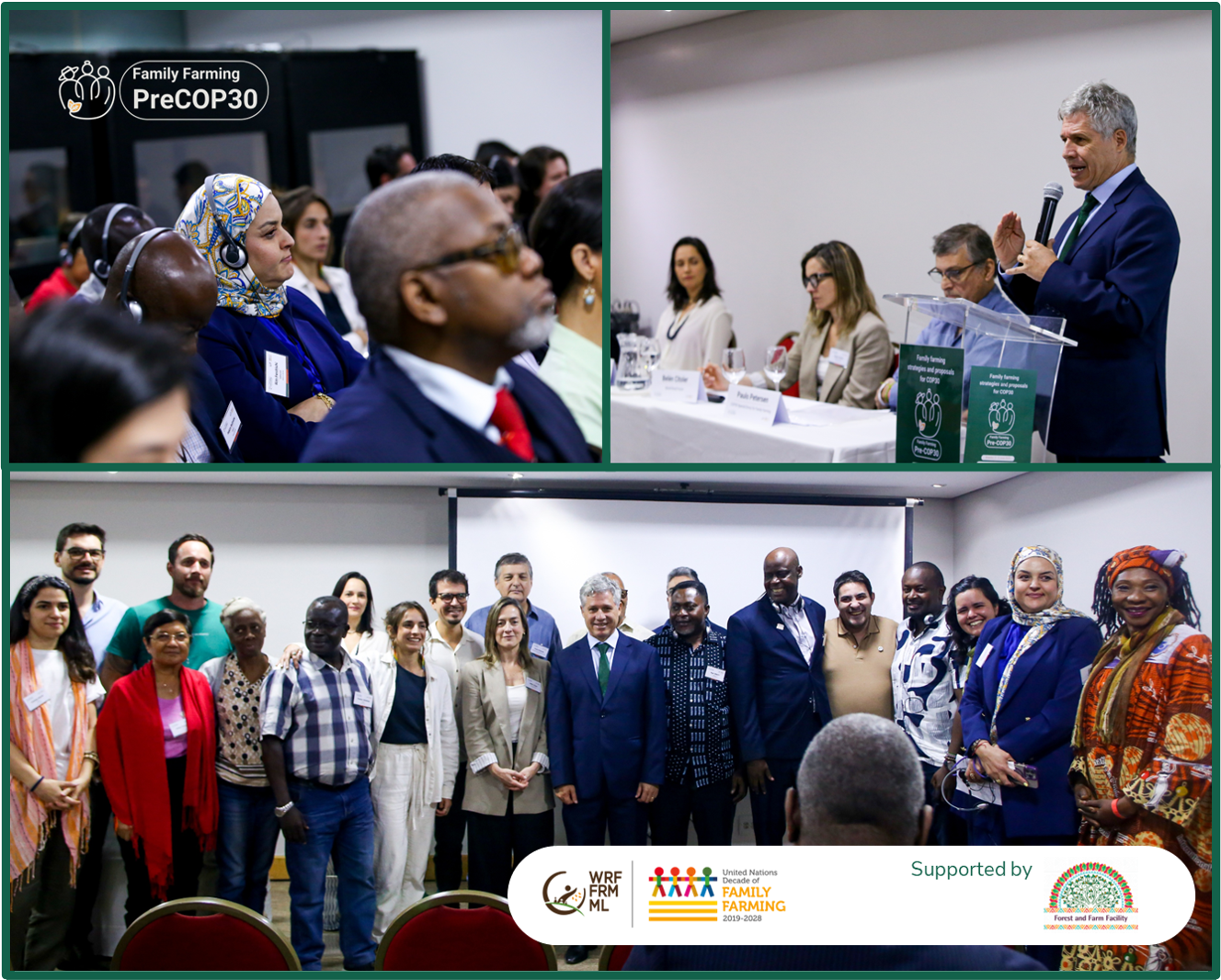The Family Farming Pre-COP30 concludes in Brasília with joint proposals to scale up the key role of family farming in effective climate action.
16 June 2025 – From 3 to 5 June, in Brasília, representatives of major family farmers’ organisations—members of the World Rural Forum (WRF) and other networks—alongside government officials, international organizations, academia, philanthropy, and multilateral development banks from Brazil and around the world, gathered in a collaborative dialogue to ensure that family farming is placed at the heart of COP30, which will be held in Belém from 10 to 21 November 2025.
Organized by the WRF with the support of the Forest and Farm Facility (FFF), the Family Farming Pre-COP30 was a strategic gathering to build joint proposals and priorities aimed at strengthening the contribution of family farming to climate action and ensuring its effective participation in the key spaces of COP30.
Family farming produces nearly 80% of the world’s food in terms of value. It does so responsibly, through practices that contribute directly to climate adaptation and mitigation, such as agroecology, sustainable land management, and biodiversity conservation. As recognised by the United Nations Decade of Family Farming (UNDFF 2019–2028), family farming is essential for building sustainable and resilient food systems—for people and the planet. Supporting family farmers at the centre of food systems represents one of the greatest opportunities to achieve the Paris Agreement. This transformation must be central to the COP30 implementation agenda.
During the event, Brazilian government authorities such as the Minister of Agrarian Development and Family Farming, Paulo Teixeira, the Deputy Minister for Environment and Climate Change, João Capobianco, and Alice Amorim, representative of the COP30 Presidency, joined specialised agencies and diplomatic representatives in expressing their commitment to family farmers and their shared interest in strong representation at COP30.
OUTCOMES OF THE PRE-COP30: SHARED PRIORITIES AND RECOMMENDATIONS FROM FAMILY FARMING
Built jointly through rich dialogues with more than 30 presentations, roundtables, and working groups, the Family Farming Pre-COP30 concluded with common proposals and priorities to position family farming in the climate negotiations toward COP30. Key points include:
- Recognition as a key actor in climate action, with effective participation in governance structures, policy formulation, and the implementation of climate finance.
- Integration of family farming into national frameworks, including Nationally Determined Contributions (NDCs), National Adaptation and Mitigation Plans, and fostering convergence with biodiversity and desertification strategies.
- Eliminating barriers to access to climate finance for family farming through appropriate mechanisms, simplified procedures, and an enabling policy environment. This requires national and global reforms and the establishment of a specific fund for empowerment and resilience, led by family farmers’ organisations.
- Empowerment of youth and women in family farming through specific policies, capacity building, equitable access to resources, and decision-making participation.
- Secure access to land and water for family farmers.
- Ensuring that COP30 positions family farming as a strategic sector and delivers clear mandates to scale up its fundamental contribution to climate solutions.
To ensure these recommendations and priorities reach COP30, it is necessary to secure explicit recognition of family farming on Food Day at COP30 and within the Brazilian Presidency’s Action Agenda, as well as to integrate specific indicators for family farming within the Global Goal on Adaptation (GGA), enabling the generation of evidence on the impacts and contributions of family farming to climate resilience. Furthermore, the presence of family farming must be strengthened in global climate finance frameworks under the UNFCCC, through the implementation of the New Collective Quantified Goal (NCQG), follow-up on the Baku to Belém Roadmap, and operationalisation of the Loss and Damage Fund, ensuring fair benefit-sharing with rural communities.
A preview of the conclusions of the Pre-COP30 on Family Farming is available in English, French, Portuguese and Spanish.
NEXT STEPS TOWARD COP30
The Family Farming Pre-COP30 has been an unparalleled opportunity to articulate proposals and priorities that position family farmers at the core of the climate agenda.
This collective effort continues. Family farming joins the call of the COP30 Presidency for a “Global Mutirão”, bringing forward concrete climate solutions from the territories while promoting ongoing dialogue with governments and international organisations.
The Family Farming Pre-COP30 marks a milestone on the road to COP30. The World Rural Forum, together with its member family farmers’ organisations, will continue its active engagement through participation in the June Climate Meetings (SB62), to be held from 16 to 26 June in Bonn. In addition, the WRF will convene a webinar dialogue with UNFCCC negotiators from different regions to delve deeper into the conclusions of the Family Farming Pre-COP30 and align family farming priorities with the positions of the State Parties.
The Family Farming Pre-COP30 has been more than a conference—it has been a coordinated process to amplify the voices of family farmers toward COP30 and beyond.



